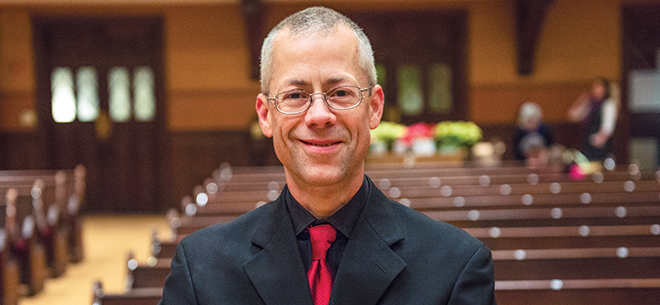Scott Metcalfe, director of Blue Heron vocal ensemble, discusses Boston’s significance as a bastion of early music

Today, not many people know what early modern music sounds like, but Scott Metcalfe has been immersed in it since childhood. When his father founded the University of Vermont Baroque Ensemble, Metcalfe would “listen to rehearsals on period instruments downstairs in the house.” In 1999, Metcalf founded his own early music vocal ensemble, Blue Heron, with two like-minded singers—Noël Bisson and Cheryl Ryder—and has been delighting Boston-area audiences with a repertoire of rarely heard masterpieces ever since.
According to Metcalfe, attending an early music concert is as “Boston” as attending a Red Sox game. “Boston has a long history as the center of the early music movement. Very important people to the movement—like Erwin Bodky at the Longy School of Music—were here already in the ’40s and ’50s. Boston is also packed with institutions of higher learning, and with people who have great interest in history, languages, literature and all the other elements that go into appreciating the music of the past.”
There are several opportunities to discover early music with Blue Heron this spring. Concerts on March 1 & 3 present music by Johannes Ockeghem, part of the ensemble’s multi-season Ockeghem@600 project to perform the complete works of this once-famous Renaissance composer in celebration of his 600th birthday in 2020. According to Metcalfe, “Ockeghem is one of the greatest composers you’ve never heard of.” This is not the concert’s only draw. Metcalfe urges those who have never heard vocal music from this era to explore it through a live experience. “The human voice is our most primal musical tool,” Metcalfe muses. “We’re evolutionarily programmed to listen to the voice more carefully than anything else.…A small group of people singing together—that’s perhaps the most powerfully emotional musical experience that one can have.”
For those who want even more, on April 14 another concert showcases Spanish songs and dances from the 15th and 16th centuries, complete with dancers and period instruments. “Boston has been shown recently, in a handful of studies, that it has one of the most active arts cultures of any city in the United States,” Metcalfe continues. “It’s no surprise that, among all the other things that people here enjoy, they will also appreciate Renaissance and medieval music.”
Blue Heron
March 1 at 7:30 p.m. at St. Cecilia’s Parish, 18 Belvidere Rd.; March 3 at 8 p.m. at First Church in Cambridge, Congregational, 11 Garden St., Cambridge; 617-960-7956, blueheron.org. $10–68.


